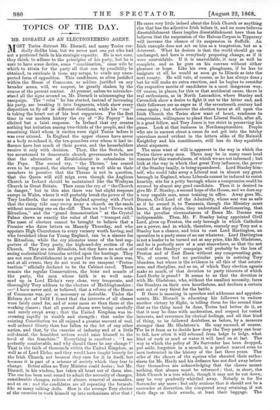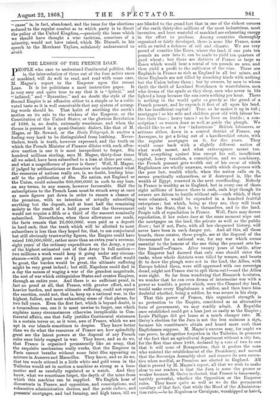TOPICS OF THE DAY.
DISRAELI AS AN ELECTIONEERING AGENT.
MOST Tories distrust Mr. Disraeli, and many Tories cor- dially dislike him, but we never met one yet who had not a profound faith in his strategic capacity. He is not sure, they think, to adhere to the principles of his party, but he is sure to have some device, some "combination," some wile by which to attain for the party all that can by possibility be obtained, to extricate it from any scrape, to evade any unex- pected form of opposition. This confidence, so often justified within the House of Commons, so seldom justified on any broader arena, will, we suspect, be greatly shaken by the course of the present contest. At present, unless we misunder- stand all the signs around us, Mr. Disraeli is mismanaging the campaign. The " cries " he has started, instead of increasing his party, are breaking it into fragments, which show every disposition to fly off in different directions, while his " cue " is taking the heart out of his best supporters. For the first time in our modern history the cry of "No Popery" has elicited but a faint response. In Ireland that cry creates nothing but irritation among two-thirds of the people, and the remaining third whom it excites were rigid Tories before it was ever uttered. In England the upper classes have never as a body re-echoed it, the ten-pounders over whom it had in- fluence have lost much of their power, and the householders receive it only with derision. They, like the Scotch, are too accustomed to democratic church government to believe that the alternative of Establishment is submission to the Pope. The second cry, " the Throne," has ceased even to be repeated, the electors being as well able as their members to perceive that the Throne is not in question, that the Queen will still reign even though the Anglican Church in Ireland should be maintained like the Wesleyan Church in Great Britain. Then came the cry of "the Church in danger," but to this also there was but slight response except in Wales, where it will probably break the power of the Tory landlords, the masses in England agreeing with Punch that the rising tide may sweep away a church on the sands without menacing one on the cliff. Then we had "Down with Ritualism," and the "grand demonstration" at the Crystal Palace shows us exactly the value of that "trumpet call." The mass of electors cannot be brought to believe that a Premier who dates letters on Maundy Thursday, and who appoints High Churchmen to every vacancy worth having, and who furnished ideas for Young England, can be a sincere foe to Ritualism, while the cry alienates some of the best sup- porters of the Tory party, the high-and-dry section of the Church. They are not Ritualists, but they have no notion of seeing ecclesiastical formulas settled upon the hustings. They are not sure Establishment is so good for them as it once was, and at all events, they do not want to see rampant "Protes- tantism" officially declared to be the Cabinet creed. There remain the regular Conservatives, the bone and muscle of the party, the men whose faith is so well sum- med up in Lord Elcho's very clear, very temperate, and thoroughly Tory address to the electors of Haddingtonshire : —" I have never said, or believed, that a reform of the House of Commons was, per se, necessary or desirable. Under the Reform Act of 1832 I found that the interests of all classes were fairly cared for, and of none more so than those of the working classes ; that all proved abuses were being carefully and surely swept away ; that the United Kingdom was in- creasing rapidly in wealth and strength ; that under the existing Constitution we all enjoyed a greater amount of real, well ordered liberty than has fallen to the lot of any other nation, and that, by the exercise of industry and of a little self-denial, the humblest artizan could raise himself to the level of the franchise." Everything is excellent ; I am perfectly comfortable, and why should there be any change ?" That is the faith of thousands within the United Kingdom, as well as of Lord Elcho, and they would have fought bravely for the Irish dhurch, not because they care for it in itself, but because it is part of a scheme of society which they fear to change. Better allies no Tory Minister could desire ; but Mr. Disraeli, in his wisdom, has taken all heart out of them also. The cue has been sent round to admit the necessity of changes, considerable changes, redress of abuses, removal of anomalies, and so on ; and the candidates are all repeating the formula like so many talking dolls. How is the average Tory elector of the counties to work himself up into enthusiasm after that ?
He cares very little indeed about the Irish Church or anything else that has the adjective Irish before it, and no more believes. disestablishment there implies disestablishment here than he believes that the suspension of the Habeas Corpus in Tipperary will increase the chance of its suspension in Suffolk. Az Irish example does not act on him as a temptation, but as a • deterrent. What he desires is that the world should go on unchanged, and here is everybody proposing change, as if it were unavoidable. If it is unavoidable, it may as well be complete, and so he goes on his canvass without either pleasure or hope. Like his own ploughman, if he has to emigrate at all, he would as soon go to Illinois as into the next county. He will vote, of course, as he has always done ; but he will make no extra exertion, and he begins to consider the respective merits of candidates in a most dangerous way. Of course, in places, for this or that accidental cause, there is. real enthusiasm, as in North Lancashire, where Stanley and. Cavendish show a desire to fight it out to the bitter end, and. their followers are as eager as if the seventeenth century had come again ; but wherever the election turns at all upon the Irish Church the Tories show want of heart, readiness to. compromise, willingness to plead that Liberal Smith, after all, is a good fellow, and Tory Jones is too strict in preserving his game. Look at that business in Northamptonshire. People who are in earnest about a cause do not get into the tetchy querulous mood evident in the letters alike of Sir Rainald. Knightley and his constituents, still less do they squabble about sixpences. The same want of will is apparent in the way in which the Tories throw away men. There may be in many cases local. reasons for this wastefulness, of which we are not informed ; but look at the way in which that great Tory influence, the power of the Stanley family, is being squandered. Lord Stanley him- self, who could take away a Liberal seat in almost any great. borough in England, whom Liberals cannot be induced to resist. heartily, sits for a petty borough where a compromise could be secured by almost any good candidate. Then it is desired to. give Mr. F. Stanley, a second hope of the House, and we dare say a very capable man, some training in office. Away goes Mr.. Ducane, Civil Lord of the Admiralty, whose seat was as safe as if he owned it, to Tasmania, though the Ministry must know, if, as they claim, they understand electioneering, that in the peculiar circumstances of Essex Mr. Ducane was. indispensable. Then, Mr. F. Stanley being appointed Civil. Lord, gives up Preston, the only borough in which Catholics are a power, and in which, therefore, scarcely any Tory not a. Stanley has a chance, and tries to oust Lord Hartington, an operation in a party sense of no use whatever. Lord Hartingtort is not a leader to be turned out at any price, like Mr. Gladstone,. and he is perfectly sure of a seat somewhere, so that the net result of the Stanleys' campaign will probably be the loss of Preston and of East Essex without any compensating gain. We, of course, feel no particular pain in noticing Tory blunders, but where is the evidence in all this of that astute- ness, and discipline, and so on, of which Tory election agents make so much, of that devotion to party interests of which Lord Derby is proud ? It seems to us that the devotion is with Mr. Gladstone, who, without the smallest necessity, faces the Stanleys on their own hearthstone, and declines a certaiu seat out of very thirst for the battle.
If there is meaning in speeches and addresses and appoint- ments, Mr. Disraeli is educating his followers to endure another victory by flight, is telling them for the second time that as the thing must be done, Tories had better do it, so- that it may be done with moderation, and respect for vested interests, and reverence for clerical feelings, and all that kind of thing, to be followed doubtless, as before, by a measure stronger than Mr. Gladstone's. He may succeed, of course. 'Far be it from us to decide how deep the Tory party can bear- to fall, how often it will rebound from ledge to ledge, what. kind of rock or mud or water it will land on at last. The way in which the policy of No Surrender has been dropped, put aside, forgotten in a month, is a perfect marvel even to- men instructed in the history of the last three years. The echo of the cheers of the squires who shouted their enthu- siasm for Mr. Hardy and his defiance has not died away before they themselves are acknowledging that the cheers meant nothing, that abuses must be reformed ; that, in short, the Irish Church is a tree which, though it may not be cut down, may be very prudently whittled away. Nobody is for No Surrender any more ; but only anxious that it should not be a. surrenderat discretion, the conquered army retaining, if not. their flags or their swords, at least their baggage. The
" cause" is, in fact, abandoned, and the issue for the elections reduced to the regular combat as to which party is to direct the policy of the United Kingdom,—precisely the issue which we should have thought a wise tactician, conscious of a minority, would not have raised, which Mr. Disraeli, in his speech to the Merchant Taylors, sedulously endeavoured to avoid.































 Previous page
Previous page